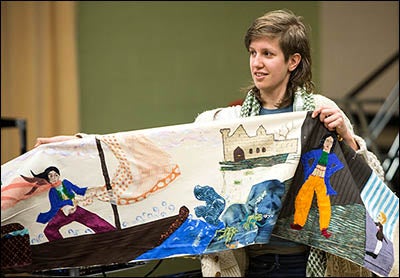EXPLORING INTERESTS
ECU Honors College seminars encourage creativity, collaboration
“The Psychology of Human-Dog Interactions,” “Global Heavy Metal Music” and “Extreme Physics,” are just a few of the seminar courses offered this semester to students in the Honors College at East Carolina University. If they sound out of the ordinary, there’s a good reason.
Faculty members from numerous disciplines compete each year to teach seminars to students in the Honors College. The Honors College Faculty Advisory Committee, made up of representatives from across campus, generally receives two dozen course proposals each March, of which 10 to 15 are chosen.
“This is a chance (for faculty) to get creative and pursue their particular passion,” said Kevin Baxter, associate dean of the Honors College.
The unique system was developed four years ago when ECU transitioned from its longstanding honors program to a formalized Honors College. They wanted the opportunity to teach honors students to be an inclusive experience for faculty with coursework selected in a transparent way, Baxter said.

In an Honors College seminar on Appalachian culture, visiting artist Anna Roberts-Gevalt demonstrates a “crankie,” a handmade moving scroll. Illustrations on the scroll depict the stories of ballads presented by Roberts-Gevalt and fellow singer Elizabeth LaPrelle.
“I wanted the opportunity to work with a small group of really bright students who would push me forward as a professor as well,” she continued. “In my experience – teaching three honors classes – honors students are more willing to challenge material, challenge their own ideas and speak up in a class setting.”
Shores also explained that honors students, generally speaking, are very focused on their academic and career goals. The unique seminar topics get them outside of their comfort zone and engaging with other subject areas. Most seminars count towards university foundations course requirements.
The courses are also designed to promote critical thinking, Shores said.
Proposed seminars must approach topics from an interdisciplinary perspective and must be suitable for freshmen and seniors alike. Baxter said the college also works with faculty whose proposals aren’t selected to improve upon their ideas for the next cycle.
Faculty must be credentialed in whatever subject they’re teaching, which Baxter said has led to some interesting partnerships. Some have occurred within colleges – like a course co-taught by faculty from technology systems and engineering – while others are more unexpected pairings. For example, honors seminars have combined bioethics and interior design, and English with biology.
“It invites a level of creativity that normal college courses don’t permit,” Baxter said.
Department deans and chairs have been very supportive of their faculty engaging with the Honors College outside their normal duties, he added.
“The seminar courses within the honors college offered me the opportunity to explore interests outside my major in a really personal setting,” said sophomore Alex Podolski. “My favorite so far has been the seminar titled ‘Free Will and Consciousness.’”
“(Dr. Laura Edwards’) passion and energy for the course material was contagious,” Podolski added. “The course moved at the pace that my fellow students and I set, and she was able to tailor it more to our interests. Though the material was difficult, it was rewarding when I finally developed an understanding.”
The Honors College at ECU is a diverse intellectual community for academically talented students of strong character. Honors students are provided with the opportunity to engage in immersive service-learning, undergraduate research and pre-professional experiences throughout their undergraduate years.
Students are housed together in an on-campus living-learning community and receive a scholarship equal to the level of in-state tuition, which is renewable for a maximum eight semesters of undergraduate work.